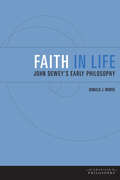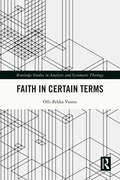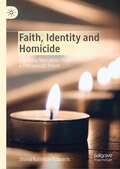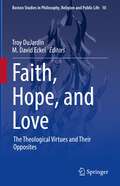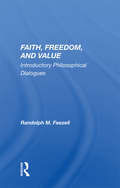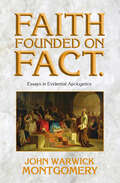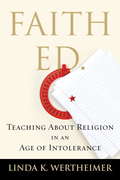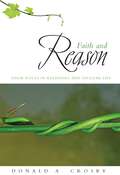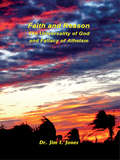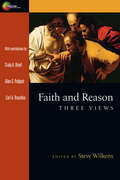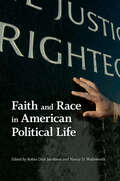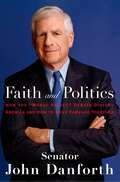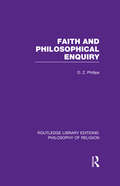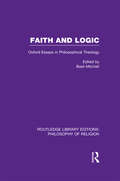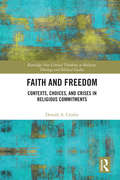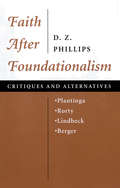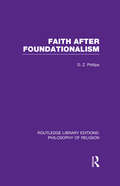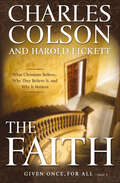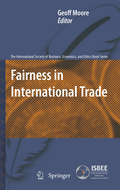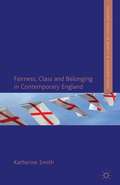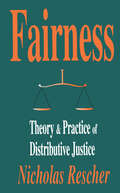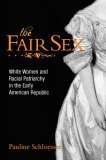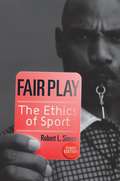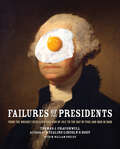- Table View
- List View
Faith in Life: John Dewey's Early Philosophy (American Philosophy)
by Donald J. MorseThis is the first book to consider John Dewey’s early philosophy on its own terms and to explicate its key ideas. It does so through the fullest treatment to date of his youthful masterwork, the Psychology. This fuller treatment reveals that the received view, which sees Dewey’s early philosophy as unimportant in its own right, is deeply mistaken. In fact, Dewey’s early philosophy amounts to an important new form of idealism. More specifically, Dewey’s idealism contains a new logic of rupture, which allows us to achieve four things:• A focus on discontinuity that challenges all naturalistic views, including Dewey’s own later view; • A space of critical resistance to events that is at the same time the source of ideals;• A faith in the development of ideals that challenges pessimists like Schopenhauer and Nietzsche; and • A non-traditional reading of Hegel that invites comparison with cutting-edge Continental philosophers, such as Adorno, Derrida, and Zizek, and even goes beyond them in its systematic approach;In making these discoveries, the author forges a new link between American and European philosophy, showing how they share similar insights and concerns. He also provides an original assessment of Dewey’s relationship to his teacher, George Sylvester Morris, and to other important thinkers of the day, giving us a fresh picture of John Dewey, the man and the philosopher, in the early years of his career. Readers will find a wide range of topics discussed, from Dewey’s early reflections on Kant and Hegel to the nature of beauty, courage, sympathy, hatred, love, and even death and despair. This is a book for anyone interested in the thought of John Dewey, American pragmatism, Continental Philosophy, or a new idealism appearing on the scene.
Faith in Certain Terms (Routledge Studies in Analytic and Systematic Theology)
by Olli-Pekka VainioThis book considers how certainty and faith are related in the Christian faith. It asks: How certain can Christian believers be about their beliefs about God? Should Christians doubt the assurance of their salvation? The chapters provide a historical analysis of both certainty of faith and assurance from the early Church to modern times while also paying attention to confessional differences. The author explores contemporary debates in analytic epistemology on the certainty and fallibility of our beliefs and argues for a fallibilist understanding of Christian faith. The book also addresses some less-discussed arguments that threaten the certainty of faith and offers an account of faith as cognitive practice. It will be of interest to scholars of both theology and philosophy.
Faith, Identity and Homicide: Exploring Narratives from a Therapeutic Prison
by Shona Robinson-EdwardsThis book explores the role that religion plays in the lives of imprisoned homicide offenders. Drawing on interviews in an English prison, the author examines how they narrate their life stories and how religion intersects with other categories to rebuild their personal identities after committing a crime and being labelled as murderers or killers. This book seeks to bridge the gap between macro and micro phenomena, examining religion as both a social institution and a personal experience. It also explores the mediating role of institutions with regards to the nature and extent of their influence upon individual choices and actions, and provides insights into the nature of the therapeutic prison. It seeks to create some clarity of understanding the complex nature of religiosity, narrative, identity, desistance and rehabilitation whilst critically examining elements of social identity that may restrict or enhance this process. It provides a series of recommendations for organisations working with convicted homicide offenders/offenders and speaks to academics and practitioners in the fields of criminology, sociology, psychology and religious/theological studies.
Faith, Hope, and Love: The Theological Virtues and Their Opposites (Boston Studies in Philosophy, Religion and Public Life #10)
by Troy DuJardin M. David EckelThese essays consider the three traditional theological virtues—faith, hope, and love—alongside their opposites—doubt, despair, and hate, from a scholarly perspective. The volume includes contributions not just from philosophers of religion, but also from psychologists, sociologists, and film and literature scholars, to paint a complex and nuanced picture of these virtues, both of how we might understand them, and how we can hope to embody them ourselves. While these virtues make up a core part of the Christian tradition, the chapters here go far and wide in search of different cultural conceptions of these universal human concerns. Inquiries are made into these virtues within Hindu, Buddhist, Jewish, and Islamic thought, alongside philosophers including Aristotle, Hegel, Kierkegaard, Nietzsche, Levinas, and Murdoch. The resulting tapestry is often beautiful, sometimes horrific, but always thoroughly human. This text appeals to students and researchers working in these fields. Chapter [9] is available open access under a Creative Commons Attribution 4.0 International License via link.springer.com.
Faith, Freedom, And Value: Introductory Philosophical Dialogues
by Randolph M. FeezellThis book contains a series of philosophical conversations between two old college friends and provides a readable and clear examination of certain fundamental philosophical questions. It shows introductory students some of the standard arguments in the history of philosophy.
Faith Founded on Fact: Essays in Evidential Apologetics
by John Warwick MontgomeryA provocative and controversial book intended to encourage Christian to make the case for the truthfulness of Christianity based on factual evidence. Included are chapters on: The Place of Reason in Christian Witness; Science, Theology, and the Miraculous; How Muslims Do Apologetics;, Dr. Johnson as Apologist. Contains the most sophisticated refutation available anywhere of the arguments of David Hume and Anthony Flew against miracles in general and the resurrection of Christ in particular.
Faith Ed
by Linda K. WertheimerAn intimate cross-country look at the new debate over religion in the public schools A suburban Boston school unwittingly started a firestorm of controversy over a sixth-grade field trip. The class was visiting a mosque to learn about world religions when a handful of boys, unnoticed by their teachers, joined the line of worshippers and acted out the motions of the Muslim call to prayer. A video of the prayer went viral with the title "Wellesley, Massachusetts Public School Students Learn to Pray to Allah." Charges flew that the school exposed the children to Muslims who intended to convert American schoolchildren. Wellesley school officials defended the course, but also acknowledged the delicate dance teachers must perform when dealing with religion in the classroom.Courts long ago banned public school teachers from preaching of any kind. But the question remains: How much should schools teach about the world's religions? Answering that question in recent decades has pitted schools against their communities.Veteran education journalist Linda K. Wertheimer spent months with that class, and traveled to other communities around the nation, listening to voices on all sides of the controversy, including those of clergy, teachers, children, and parents who are Muslim, Jewish, Christian, Sikh, or atheist. In Lumberton, Texas, nearly a hundred people filled a school-board meeting to protest a teacher's dress-up exercise that allowed freshman girls to try on a burka as part of a lesson on Islam. In Wichita, Kansas, a Messianic Jewish family's opposition to a bulletin-board display about Islam in an elementary school led to such upheaval that the school had to hire extra security. Across the country, parents have requested that their children be excused from lessons on Hinduism and Judaism out of fear they will shy away from their own faiths.But in Modesto, a city in the heart of California's Bible Belt, teachers have avoided problems since 2000, when the school system began requiring all high school freshmen to take a world religions course. Students receive comprehensive lessons on the three major world religions, as well as on Sikhism, Hinduism, Buddhism, and often Shintoism, Taoism, and Confucianism. One Pentecostal Christian girl, terrified by "idols," including a six-inch gold Buddha, learned to be comfortable with other students' beliefs. Wertheimer's fascinating investigation, which includes a return to her rural Ohio school, which once ran weekly Christian Bible classes, reveals a public education system struggling to find the right path forward and offers a promising roadmap for raising a new generation of religiously literate Americans.
Faith and Reason: Their Roles in Religious and Secular Life
by Donald A. CrosbyFew words are as widely misconceived as the word "faith." Faith is often set in stark opposition to reason, considered antithetical to scientific thought, and heavily identified with religion. Donald Crosby's revealing book provides a more complex picture, discussing faith and its connection to the whole of human life and human knowledge. Crosby writes about that existential faith that underlies, shapes, and supports a person's life and its sense of purpose and direction. Such faith does not make a person religious and being secular does not mean one rejects all forms of faith. Throughout the book Crosby makes the case that faith is fundamentally involved in all processes of reasoning and that reason is an essential part of all dependable forms of faith.Crosby elaborates the major components of faith and goes on to look at the mutually dependent relationships between faith and knowledge, faith and scientific knowledge, and faith and morality. The work's final chapters examine crises of faith among several noted thinkers as well as the author's own journey of faith from plans for the ministry to pastor to secular philosopher and religious naturalist.
Faith and Reason: The Universality Of God And Fallacy Of Atheism
by Jim I. JonesFaith and Reason may be of interest to people who wish to see a path to God based on reason. A concept of God is foundational for the sciences, philosophy, anthropology, psychology, and sociology as well as theology and major religions. The concept of no god and atheism is fallacious; it is nonsense to deny the universality of God, which plays a significant role in the lives of more than three-quarters of the world’s people. The book includes ideas from distinguished theologians, philosophers and scientists. The need for consideration of a theological framework for religion is presented. Its purpose is twofold. First, it acts as a roadmap for understanding societal and personal improvement and advancement initiatives that use a holistic view of the history of relevant philosophical perspectives to present how belief and commitment to community can guide improving the human condition. Second, it presents detailed modeling constructs, and references to specific thinkers and philosophers to demonstrate the need for a spiritual relationship with God and each other.
Faith and Race in American Political Life (Race, Ethnicity, and Politics)
by Robin Dale Jacobson and Nancy D. WadsworthDrawing on scholarship from an array of disciplines, this volume provides a deep and timely look at the intertwining of race and religion in American politics. The contributors apply the methods of intersectionality, but where this approach has typically considered race, class, and gender, the essays collected here focus on religion, too, to offer a theoretically robust conceptualization of how these elements intersect--and how they are actively impacting the political process.ContributorsAntony W. Alumkal, Iliff School of Theology * Carlos Figueroa, University of Texas at Brownsville * Robert D. Francis, Lutheran Services in America * Susan M. Gordon, independent scholar * Edwin I. Hernández, DeVos Family Foundations * Robin Dale Jacobson, University of Puget Sound * Robert P. Jones, Public Religion Research Institute * Jonathan I. Leib, Old Dominion University * Jessica Hamar Martínez, University of Arizona * Eric Michael Mazur, Virginia Wesleyan College * Sangay Mishra, University of Southern California * Catherine Paden, Simmons College * Milagros Peña, University of Florida * Tobin Miller Shearer, University of Montana * Nancy D. Wadsworth, University of Denver * Gerald R. Webster, University of Wyoming
Faith and Politics
by Senator John DanforthSenator John Danforth , an ordained Episcopal priest and former U. S. senator, writes about one of the most conflictridden issues in America: the intersection of government and religion. In Faith and Politics, he takes on many of the polarizing hot-button issues, including stem- cell research, abortion, school prayer, and gay marriage. He expresses dismay at his party for at times straying from traditional Republican principles to pursue an agenda of "wedge" issues. We must, Danforth appeals, move forward together, drawing on our faith to help us live as one nation. Danforth's book is a much-needed clarion call to all Americans.
Faith and Philosophical Enquiry (Routledge Library Editions: Philosophy of Religion)
by D.Z. PhillipsThe concern of this book is the nature of religious belief and the ways in which philosophical enquiry is related to it. Six chapters present the positive arguments the author wishes to put forward to discusses religion and rationality, scepticism about religion, language-games, belief and the loss of belief. The remaining chapters include criticisms of some contemporary philosophers of religion in the light of the earlier discussions, and the implications for more specific topics, such as religious education, are investigated. The book ends with a general attempt to say something about the character of philosophical enquiry, and to show how important it is to realise this character in the philosophy of religion.
Faith and Logic: Oxford Essays in Philosophical Theology (Routledge Library Editions: Philosophy of Religion)
by Basil MitchellWhen this book was originally published in 1957 there had been lively debates on the air and in the press about the bearing of modern philosophy upon Christianity, but there had been relatively little sustained discussion of the subject. This book of essays was the product of a small group of Oxford philosophers and theologians, who had met and talked informally for some years before writing it. It is an attempt to discuss with care and candour some of the problems raised for Christian belief by contemporary analytical philosophy. In asking the questions raised, this book makes articulate the perplexities of many intelligent people, both believers and unbelievers. The contributors concentrate on the way such concepts as God, Revelation, the Soul, Grace are actually used rather than asserting or denying some very general theory of meaning.
Faith and Freedom: Contexts, Choices, and Crises in Religious Commitments (Routledge New Critical Thinking in Religion, Theology and Biblical Studies)
by Donald A. CrosbyIt is sometimes thought that individual religious faith should be firmly fixed in the traditions of the past. That once it is established in someone’s life, it should remain steadfast and unchanging throughout personal, cultural, or any other changes. This book subverts that idea by showing how it is actually ongoing inquiry, examination, and indeed change, requiring similarly ongoing acts of informed and responsible freedom, that will produce a dynamic and meaningful faith. Contending that religious faith should readily encompass deliberate and ongoing acts of personal freedom, the text outlines various ways in which these dual aspects are more ally than enemy. It also demonstrates how the ongoing free choices that are required for genuine faith are not absolute, but are in fact contextualized and conditioned by genetic makeup, environmental conditioning, and present character traits produced in part by a person’s past choices. Despite this caveat, personal freedom is presented as genuine and real, with a vitally important role to play in a person’s religiosity. The book concludes with some observations of this process in practice in the author’s own journey from a Christian theist worldview to that of a religious naturalist. This is a fascinating treatise on the role of personal freedom in religious faith. It will, therefore, be of significant interest to scholars of religion, theology, philosophy of religion and religious naturalism.
Faith After Foundationalism: Plantinga-rorty-lindbeck-berger-- Critiques And Alternatives (Routledge Library Editions: Philosophy Of Religion Ser.)
by D. Z. PhillipsIn a brilliant series of essays, the distinguished philosopher D. Z. Phillips explores the alternatives for faith after foundationalism. A significant exploration of post-foundationalist thought in its own right, Faith After Foundationalism is also an important evaluation and critique of the theological implications of the views of Alvin Plantinga, Richard Rorty, George Lindbeck, and Peter Berger.Phillips's own position is that one must resist the philosopher's tendency to turn religious mystery into epistemological mystery. To understand how religious concepts are formed is to understand that to speak of God as ?beyond mortal telling? is not to confess a failure of language. God's hiddenness is part of our concept of him?a reflection of the mystery of human life as it is lived.Faith After Foundationalism will be essential reading for philosophers of religion and theologians, as well as for students of contemporary epistemology.
Faith after Foundationalism: Plantinga-rorty-lindbeck-berger-- Critiques And Alternatives (Routledge Library Editions: Philosophy of Religion)
by D.Z. PhillipsFoundationalism is the view that philosophical propositions are of two kinds, those which need supporting evidence, and those which in themselves provide the evidence which renders them irrefutable. This book, originally published 1988, describes the battle between foundationalism, which places belief in God in the first category, and various other approaches to the problem of faith – ‘Reformed Epistemology’, hermeneutics; and sociological analysis. In the concluding section of the book, an examination of concept formation in religious belief is used to reinterpret the gap between the expressive power of language and the reality of God.
The Faith: What Christians Believe, Why They Believe It, and Why It Matters
by Charles Colson Harold FickettRightly understood and rightly communicated, the Christian faith is one of great joy. It is an invitation to God's kingdom, where tears are replaced by laughter and longing hearts find their purpose and their home.This is the heart of the gospel: God's search to reclaim us and love us as his own. But have we truly grasped this? Those of us who have disdained Christianity as a religion of bigotry--have we repudiated the genuine article or merely demonstrated our own prejudice and ignorance? Those of us who are Christians--have we deeply apprehended the mission of Jesus, and do our ways and character faithfully reflect his beauty? From the nature of God, to the human condition, to the work of Jesus, to God's coming kingdom, and all that lies between, how well do we understand the foundational truths of Christianity and their implications?The Faith is a book for our troubled times and for decades to come, for Christians and non-Christians alike. It is the most important book Chuck Colson and Harold Fickett have ever written: a thought-provoking, soul-searching, and powerful manifesto of the great, historical central truths of Christianity that have sustained believers through the centuries. Brought to immediacy with vivid, true stories, here is what Christianity is really about and why it is a religion of hope, redemption, and beauty.
Fairness in International Trade
by Geoff MooreThis book arises out of papers delivered at the World Congress of the International Society of Business, Economics and Ethics (ISBEE) held in Cape Town in 2008. There are two sections. First, a number of key papers provide an insight into global business, wealth creation and welfare issues with particular reference to the African continent - appropriate for a Congress that was based in South Africa and drew wide participation from African scholars. Second, it provides the output from a global research project on "Fairness in International Trade" which ran over the two years prior to the Congress. This project drew together the work of scholars in five regions across the globe and is the first time that such a global perspective has been attempted. This book is aimed at academics working in the area of international trade or development economics particularly those who have an interest in the ethical dimensions of trade. It will also be of interest to students of development economics and business ethics particularly at Masters and Doctoral level.
Fairness, Class and Belonging in Contemporary England
by Katherine SmithUsing experiences of the white, English, working-classes in Manchester, this book explores the local frustrations with feeling 'ignored' and 'neglected' by the government through articulations of fairness.
Fairness
by Nicholas RescherIn theory and practice, the notion of fairness is far from simple. The principle is often elusive and subject to confusion, even in institutions of law, usage, and custom. In Fairness, Nicholas Rescher aims to liberate this concept from misunderstandings by showing how its definitive characteristics prevent it from being absorbed by such related conceptions as paternalistic benevolence, radical egalitarianism, and social harmonization. Rescher demonstrates that equality before the state is an instrument of justice, not of social utility or public welfare, and argues that the notion of fairness stops well short of a literal egalitarianism.Rescher disposes of the confusions arising from economists' penchant to focus on individual preferences, from decision theorists' concern for averting envy, and from political theorists' sympathy for egalitarianism. In their place he shows how the idea of distributive equity forms the core of the concept of fairness in matters of distributive justice. The coordination of shares with valid claims is the crux of the concept of fairness. In Rescher's view, this means that the pursuit of fairness requires objective rather than subjective evaluation of the goods being shared. This is something quite different from subjective equity based on the personal evaluation of goods by those laying claim to them. Insofar as subjective equity is a concern, the appropriate procedure for its realization is a process of maximum value distribution. Further, Rescher demonstrates that in matters of distributive justice, the distinction between new ownership and preexisting ownership is pivotal and calls for proceeding on very different principles depending on the case. How one should proceed depends on context, and what is adjudged fair is pragmatic, in that there are different requirements for effectiveness in achieving the aims and purposes of the sort of distribution that is intended.Rescher concludes that fairness is a fundamentally ethical concept. Its distinctive modus operandi contrasts sharply with the aims of paternalism, preference-maximizing, or economic advantage. Fairness will be of interest to philosophers, economists, and political scientists.
The Fair Sex: White Women and Racial Patriarchy in the Early American Republic
by Pauline E. SchloesserChoice Outstanding Academic Title 2002 Once the egalitarian passions of the American Revolution had dimmed, the new nation settled into a conservative period that saw the legal and social subordination of women and non-white men. Among the Founders who brought the fledgling government into being were those who sought to establish order through the reconstruction of racial and gender hierarchies. In this effort they enlisted "the fair sex,"&#--white women. Politicians, ministers, writers, husbands, fathers and brothers entreated Anglo-American women to assume responsibility for the nation's virtue. Thus, although disfranchised, they served an important national function, that of civilizing non-citizen. They were encouraged to consider themselves the moral and intellectual superiors to non-whites, unruly men, and children. These white women were empowered by race and ethnicity, and class, but limited by gender. And in seeking to maintain their advantages, they helped perpetuate the system of racial domination by refusing to support the liberation of others from literal slavery. Schloesser examines the lives and writings of three female political intellectuals--;Mercy Otis Warren, Abigail Smith Adams, and Judith Sargent Murray--;each of whom was acutely aware of their tenuous position in the founding era of the republic. Carefully negotiating the gender and racial hierarchies of the nation, they at varying times asserted their rights and demurred to male governance. In their public and private actions they represented the paradigm of racial patriarchy at its most complex and its most conflicted.
Fair Play
by Robert L. SimonIn this updated third edition, Simon (philosophy, Hamilton College) provides a philosophical analysis of the ethics of competitive athletics. A critique of moral and ethical relativism is offered in the introductory chapter in order to establish the justifiability of moral judgments made in subsequent sections. Simon defends competition against its critics as being, ideally, a "mutual quest for excellence," as opposed to a mere manifestation of selfishness, and he applies internal and external hypotheses as regards the origin of sports morality to particular issues of sportsmanship and fairness. New to the third edition is an examination of genetic enhancement and sports. Other moral and ethical issues and dilemmas explored include the use of performance-enhancing drugs, gender equity in sports, the commercialization of sports, violence, collegiate athletics, and the role of sports in moral education. Annotation ©2011 Book News, Inc. , Portland, OR (booknews. com)
Fair Play
by Robert L. SimonAddressing both collegiate and professional sports, the updated edition of Fair Play explores the ethical presuppositions of competitive athletics and their connection both to ethical theory and to concrete moral dilemmas that arise in actual athletic competition. A major new section in chapter four examines the ethics of genetically enhancing athletic abilities. Other new material covers the analysis of sports and games according to influential philosopher Bernard Suits; the morality of cheating and the ethics of strategic fouling; and the impact of performance-enhancing drugs on the legitimacy of records. In addition, Simon provides enhanced considerations of the morality of competition in sports, the ethical aspects of violence in sports, and the arguments in defense of intercollegiate sports.
Failures of the Presidents: From the Whiskey Rebellion and War of 1812 to the Bay of Pigs and War in Iraq
by Thomas J. Craughwell M. William PhelpsTake a humbling journey through America’s proud history with this engaging and informative look at the nation’s most epic presidential blunders.Failures of the Presidents recounts twenty of the worst bad calls to come out of the executive office, ranging from the nation’s birth to the start of the twenty-first century. Author Thomas Craughwell begins with George Washington, who tried to pay for the Revolutionary War with a tax on whiskey—a choice that sparked the newly formed country’s first bloody rebellion.Centuries later, another George—the second President Bush—was convinced that Iraq was hiding weapons of mass destruction. His invasion of the country resulted in a protracted, deadly, and costly war that gave a serious blow to American credibility around the world.Between these episodes, there were many other regrettable, embarrassing, or downright disastrous mistakes made by residents of the White House—the worst of which are explored in this book.
